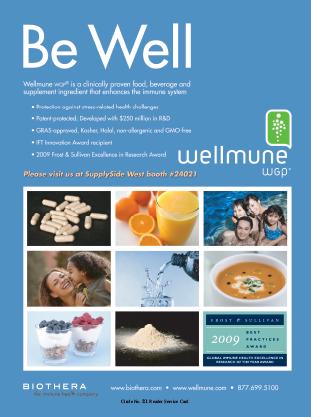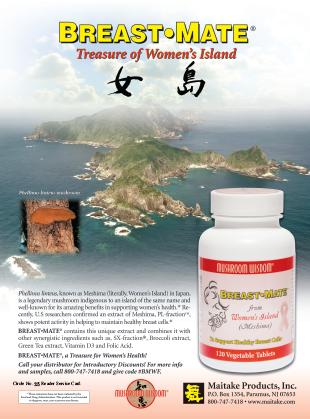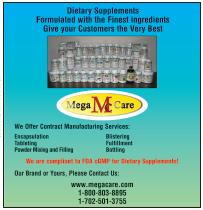
As November arrives, so do chilly temperatures, family gatherings…and cold and flu season. As an unwelcome part of the holiday time of year, even
those who live in warmer climates are prone to illness from these stressful months and changing weather. It is important to ensure that our immune systems are kept strong to stave off the illnesses that knock our lives out of balance.
Consumers have known for a long time that the natural products industry offers great options for immune system care. However, it is crucial that retailers are armed with the correct information and products to best help their customers.
Steve Holtby, president and CEO of Los Angeles, CA-based Soft Gel Technologies, Inc., says, “Marketing dietary supplements in the immune category is tough because FDA laws prevent marketers from saying what a product is capable of doing other than as a structure/function claim. Every supplement company is trying to find new ways to promote their immune support products, and some even take the risk of making cancer claims. This exposes that brand to enforcement action by the FDA and tarnishes the reputation of the supplement industry in general. Retailers should support those brands that don’t make outlandish claims, but only reference that their antioxidant and/or immune formula supports proper immune system function.”
With this in mind, immune system care is very individualized. Retailers must be aware of this to properly g uide customers to stay their healthiest and happiest.
It’s Not Always Better to Boost
 Experts agree that many people can benefit from a strengthened immune system. But, this doesn’t necessarily always mean an immune “boost.” For example, retailers should articulate the difference between long-term and acute care to customers. Certain supplements may be taken at lower doses on a regular basis for chronic protection, but also can be taken at higher doses for acute care (e.g., vitamin C); other supplements may be more damaging than beneficial if taken for too long. Therefore, having a thorough knowledge of the differences between immune modulators and immune boosters/stimulants is imperative.
Experts agree that many people can benefit from a strengthened immune system. But, this doesn’t necessarily always mean an immune “boost.” For example, retailers should articulate the difference between long-term and acute care to customers. Certain supplements may be taken at lower doses on a regular basis for chronic protection, but also can be taken at higher doses for acute care (e.g., vitamin C); other supplements may be more damaging than beneficial if taken for too long. Therefore, having a thorough knowledge of the differences between immune modulators and immune boosters/stimulants is imperative.
Bryan Rodriguez, technical marketing and scientific affairs manager for Lonza, Allendale, NJ, explains, “If the immune booster is an ingredient that ‘activates’ the immune system, then the immune modulator is the ingredient that optimizes it, bringing the immune system to a state ready to address immune challenges.”
 In addition, says Bradley West, N.D., research advisor for Nordic Naturals, Watsonville, CA, “Immune modulators are known to be tonifying and, in effect, balance an overactive or underactive immune system.” Therefore, modulators may be more helpful when normalizing the immune system on a daily basis, rather than using an immune stimulator when illness strikes.
In addition, says Bradley West, N.D., research advisor for Nordic Naturals, Watsonville, CA, “Immune modulators are known to be tonifying and, in effect, balance an overactive or underactive immune system.” Therefore, modulators may be more helpful when normalizing the immune system on a daily basis, rather than using an immune stimulator when illness strikes.
As an example of how using acute care too often can be damaging, Jocelyn Bérubé, M.Sc., scientific director at innoVactiv, Inc., Rimouski, Quebec, Canada, says, “One may be willing to use an anti-inflammatory extract to prevent sport-related inflammation. However, if that person uses the product every day, there is a risk that normal inflammatory reactions (needed to defend the body against aggressions) will be inhibited as well, meaning an increased risk of infection.”
Don Cox, Ph.D., vice president of healthcare research and development at Biothera, Eagan, MN, agrees that the use of immunity products is delicate: “There is an important distinction to be made between immune enhancement and immune stimulating.” When used inappropriately, he says, “Immune stimulators may be harmful by causing an artificial increase in immune activity. They may even trigger autoimmune disease.”
|
Sometimes, It’s Not Good To Compromise
Stress and lack of sleep. High cortisol levels can suppress the immune system. Environment. Says Larry Robinson, Ph.D., vice president, scientific affairs, Embria Health Sciences, Ankeny, IA, “Exposure to environmental toxins such as PCPs (polychlorinated biphenyls), various pesticides and chemical preservatives can weaken the immune system.” Poor diet. If the body doesn’t have the nutrients it needs to function, immunity will almost certainly be compromised. Bad gut health/flora balance. “Unfortunately,” says Lisa Peterson Love, marketing director for Nutri-Health Supplements, LLC/Sedona Labs, Cottonwood, AZ, “Most people have taken antibiotics or other drugs that may have depleted their population of good bacteria. Highly chlorinated tap water, stress and poor diets low in natural fiber and high in sugars may also deplete your natural population. Supplementing daily with probiotics is a good way to ensure you have enough good bacteria to activate a normal immune response.” Age. Our levels of immunity are not constant and fluctuate from the day we are born. Bradley West, N.D., research advisor for Watsonville, CA-based Nordic Naturals, says, “The very young have immature immune systems that are not capable of defending against all illnesses well. The very young have permeable guts as well, which mature as they get older, but leave them vulnerable to more illnesses.” On the other hand, West says, “In the elderly, both cellular and humoral immune responses [antibody-mediated immunity] are modified and decrease with advancing age. Much of the decrease in immune response seen in elderly populations is associated with changes in T cell responses. The gradual drop in stomach acid, known an hypochlorhydria, is also quite pervasive in human adults as we age and leaves the immune system more vulnerable.” Gender. Says Robinson, “In some instances, immunity is affected by gender. For example, about 75% of autoimmune disease occurs in women. The reason for this is uncertain, but appears to be due to the effects of estrogen on the immune system.” To address customers’ specific needs, says Steve Holtby, president and CEO of Soft Gel Technologies, Inc., Los Angeles, CA, “Retailers can create various sections in their stores for immune products, since many of them fit into several condition-specific categories, such as antioxidants, detoxification, stress/energy, cold and flu/wellness, and general immune health.” |
Anyone without a perfect lifestyle and perfect genetics-ergo,everyone-will benefit from strengthening their immune systems." - Larry Robinson, PhD. Embria Health Sciences
Adding to this is Larry Robinson, Ph.D., vice president, scientific affairs, Embria Health Sciences, Ankeny, IA: “Not all people would want their immune systems further boosted—which is exactly what many of the immune health products on the market purport to do. Rather, some people, such as allergy sufferers, would benefit from a suppressed immune response.” Instead of a seasonal approach to immune health, Robinson emphasizes the importance of year-round immune system balance that can be helped through the use of modulators including adaptogenic herbs such as Panax ginseng, Siberian ginseng (Eleutherococcus senticosus), ashwagandha, astragalus and schisandra.
On the other hand, immune boosters are typically recommended at the onset of illness or during times of high stress. One of the most commonly known natural remedies for immune health is Echinacea, but experts have varying opinions about how it should be used.
Eileen Sheets, managing director of Bioforce USA, Ghent, NY, says, “Fresh-processed Echinacea—not dried—has been shown in numerous studies to be effective against symptoms incurred by rhinovirus.” She says that her company’s Echinaforce product puts the immune system on “standby” and “rather than a very fast, high rise in response, it is not as high, but is sustained longer, giving the body more time to fight the challenge.”
Keri Marshall, M.S., N.D., medical director of Gaia Herbs, Brevard, NC, adds that research shows the area of the Echinacea plant from which the supplement is made is crucial. Gaia’s patented alkylamide extraction process from roots “demonstrates superior ability to support immune symptoms rapidly at the onset.” Nonetheless, the aerial (flower, leaf and stem) fraction of Echinacea may be more helpful during cold and flu season. “The part of the Echinacea plant is very specific to what part in the life cycle a disease state is in,“ Marshall explains. Therefore, retailers should be aware of which part of the Echinacea plant is contained within various products to better help customers.
Echoing the importance of acute versus chronic care, Audra Foster, N.D., a Watsonville, CA-based Vitalah advisory board member, says, “Echinacea should only be taken for acute conditions only because the body may develop a tolerance to it after being taken for more than two weeks.”
Another key player in the immunity market is vitamin C. Foster says, “Vitamin C plays an important role in the natural approach to immune enhancement. It will increase the white blood cell response and function, increase interferon (a special chemical factor that fights viral infection and cancer) levels, increase the secretion of thymus hormones and improve the integrity of the linings of mucous membranes.”
There are several other established standbys in the immune health category, many of which have much data backing.
Jonny Bowden, Ph.D., CNS, board-certified nutrition specialist consulting for Barlean’s Organic Oils, Ferndale, WA, says, “The compounds in olive leaf, for example, have been found in research to be effective against a host of microorganisms—it’s a great tonic for prevention and for the overall health of the immune system.”
To confirm the power of olive leaf, Andreas Koch, marketing director for Barlean’s adds, “Olive trees live for thousands of years, resisting attacks from bacteria, viruses, fungi and a range of microorganisms.” He notes that liquid extracts, can pack nearly double the antioxidant capacity of green tea extract and has 400% higher than vitamin C.
|
Discover How to Recover
Homeopathy. Matt Warnock, president of RidgeCrest Herbals, Salt Lake City, UT, says, “Homeopathy is based on the concept of triggering a healing response from the body itself, using infinitesimally small doses of medicine that would, in larger doses, provoke similar symptoms in a healthy person. Thus, coffee (coffee cruda) might be used to fight sleeplessness, or goldenrod (solidago canadensis) might be used to control hay fever. Though these particular remedies seem counter-intuitive, and the exact method of action is unknown, homeopathic remedies seem to modulate (trigger, enhance or suppress) the body’s natural immune healing responses, to gently move the entire body system toward health and wellness.” Although remedies are helpful, he stresses that nutrition is the most important starting point for getting healthy again. Warnock says, “Homeopathic treatment without sound nutrition is like pressing the accelerator on a car that has no gas in the tank—you may get a response, but it still might not take you where you need to go. Tonic herbs can put the ‘gas in the tank’ for a faster and more complete recovery.” Nutrition. Despite the importance of nutrition, sometimes our appetites aren’t quite where they should be after illness, which can lead to nutrient deficiencies. Supplements can also help with this. Trisha Sugarek, new product development specialist and national educator for Bluebonnet Nutrition Corp., Sugar Land, TX, says, “When in recovery, the protein needs of the body are increased. Persons who are healing or in recovery should receive anywhere from 1 g to 1.5 g of protein per kilogram of body weight.” Whey protein supplements are an easy way to get this nutrition. Healthy DNA. Sugarek also recommends supplementation of nucleotides, the building blocks of DNA and mRNA. “Most cells can synthesize nucleic acid bases to make nucleotides, but it is complex and costly to the body. Therefore, in times of greater need, such as rapidly growing tissues (GI tract, blood cells, bone marrow, etc.) have a limited capacity to synthesize nucleotides and may not be capable of keeping up with the greater demand without necessary supplementation during the recovery and healing process.” Reference |
According to Holtby, the following supplements can also help support the immune system:
- Eleutherococcus extract diminishes fatigue and boosts energy by increasing the weight of the adrenal glands and regulating levels of cortisol.
- Shark cartilage has antioxidant properties and helps support healthy immune system function.
- Astragalus is used for prevention and to addresses the common cold and chronic hepatitis. A combination of astragalus and Echinacea is common for protection against common infections of the mucous membranes.
- Elderberry extract has been found to protect cells from harmful invaders.
- Larch arabinogalactan increases gut microflora, is an immunostimulant, anti-inflammatory agent and is used for hepatic encephalopathy. This compound has been shown to have a stimulatory effect in both animal and human models, says Rodriguez. This soluble polysaccharide from the bark and wood of the Larch tree has been shown to enhance natural killer (NK) cell cytotoxicity, and to support cytokine production, to activate macrophages and increase white blood cell counts.
- Maitake mushrooms are recognized for their beta-glucans, unique polysaccharides that help support immune function and may lower blood cholesterol levels.
 Regarding mushrooms, information provided by Lake Forest, IL-based North American Herb & Spice states, “At present, pharmaceutical and nutraceutical products from mushrooms may be worth more than 1.2 billion dollars.” New research on mushrooms is continually developing; the Chaga mushroom (Inonotus obliquus) is one that may have promise on the immunity front. Although it has been used medicinally in teas and remedies since the 16th century, new research is bringing to light the anticancer, antitumor, antioxidant, antimutagenic and adaptogenic properties of this unique mushroom. A 2007 study found that compared to other medicinal fungi (Agaricus blazei, Ganoderma lucidum and Phellinus linteus), the Chaga mushroom showed the strongest antioxidant activity in terms of superoxide and hyroxyl radical scavenging activities (1).
Regarding mushrooms, information provided by Lake Forest, IL-based North American Herb & Spice states, “At present, pharmaceutical and nutraceutical products from mushrooms may be worth more than 1.2 billion dollars.” New research on mushrooms is continually developing; the Chaga mushroom (Inonotus obliquus) is one that may have promise on the immunity front. Although it has been used medicinally in teas and remedies since the 16th century, new research is bringing to light the anticancer, antitumor, antioxidant, antimutagenic and adaptogenic properties of this unique mushroom. A 2007 study found that compared to other medicinal fungi (Agaricus blazei, Ganoderma lucidum and Phellinus linteus), the Chaga mushroom showed the strongest antioxidant activity in terms of superoxide and hyroxyl radical scavenging activities (1).
Also related to mushrooms is active hexose correlated compound (AHCC), a proprietary hybridization of several mushrooms with powerful antiviral and anti-inflammatory properties. This substance can increase T-cell count by as much as 200%, increase the production of “surveillance”cells such as NK cells and macrophages, as well as increase the production of cytokines TNF-a and gamma interferon (2).
Another unique substance, according to Bowden, is coconut oil, which contains lauric acid for anti-microbial and anti-viral fortification.
Our Gut Feelings on Immunity
Immune systems are complex, involving countless components including the lymphatic system, the spleen, bone and many others. But lately, our digestive systems are what have been spotlighted in immune health.
Marshall, says, “Our digestive system plays a large role in overall health, and not just immunity, because of the old saying, ‘we are what we eat.’ In other words, the nutrients that we take in every day from food and/or supplements determine the health of our bodies. If we eat too many foods that are irritating to us (and for each of us this is uniquely different for each of us), meaning they cause excess inflammation in our GI systems, and then our bodies will continually be in a state of inflammation and the immune systems will already be stressed when they are faced with an immunity challenge.”
 At the same time, the digestive area is often referred to as the “window to the body” because so many of our immunity cells are located in the gut.
At the same time, the digestive area is often referred to as the “window to the body” because so many of our immunity cells are located in the gut.
West says, “Digestive health factors greatly into immunity because 80% of our antibody-producing cells are found in or near the digestive tract. When digestive health is compromised, this also affects the functioning of the immune cells in the gastrointestinal tract. Adequate amounts of enzymes, bile, hydrochloric acid and good bacteria are all crucial to digestive health, and if these are less than optimal, immune health suffers.”
To explain this further, Bérubé says, “One good way to look at intestinal immunity and mucosal immunity in general (such as in the lungs or urogenital tract) is [to compare them to] a country’s border. You may want to have a physical barrier first, such as a wall. This is our tightly joined mucosal cells. For more security, you way want to have a fence in front of it. This is our defense—IgA antibodies secreted on the mucosal surface. Finally, you want patrols and guards in case someone breaks in. That is the role of our residing antigen-presenting cells, as well as B and T lymphocytes that may coordinate an immune response and fight back infection.”
 When proper digestion does not occur and food particles are left undigested, inflammatory, malabsorption and possible autoimmune problems can also arise.
When proper digestion does not occur and food particles are left undigested, inflammatory, malabsorption and possible autoimmune problems can also arise.
A great place to start addressing this is to ensure proper eating habits. Says Sheets, “When talking about immune support via healthy digestion, retailers can educate their customer base about healthy stress management and eating slowly—eating too fast results in unchewed and harder to digest food and fewer nutrients being absorbed. Further, poorly digested food can stress the lower GI and colon by displacing and stressing the healthy flora.”
Healthy flora are essential for proper digestive balance. According to West, the optimal ratio is about 80–85% beneficial bacteria to 15–20% potentially harmful bacteria. When this ratio is maintained, he says, “the good bacteria prevent overgrowth of bad bacteria, by forming lactic acid and some B vitamins for instance, and digestion and immunity can then function optimally.”
However, says Lisa Peterson Love, marketing director, Nutri-Health Supplements, LLC/Sedona Labs, Cottonwood, AZ, “Your permanent population of good bacteria is acquired by the age of two. After that, you don’t acquire any more permanent residents. Some strains are ‘high adhering’ and will stick around longer, but none will stay permanently. That is why daily supplementation is most helpful.”

|
Guinea Pigs or Swine Free?
|
In a double-blind, placebo-controlled study referenced by Gene Bruno, MS, MHS, consultant to Los Angeles, CA-based Jarrow Formulas and dean of academics at Huntington College of Health Sciences, a combination of L. acidophilus and B. lactis reduced the incidence of fever, coughing and runny nose combined by 48% in children three to five years old. According to Bruno, “In this case, it was the prophylactic use of antibiotics that made the difference.” L. acidophilus alone reduced incidence by 32%.
Autoimmune Conditions
Typically, a healthy immune system can distinguish friend from foe when it comes to foreign invaders. However, in some cases, the immune system will misfire, and attack the body’s own organs and tissues. In other words, an autoimmune condition. In addition to the damage caused by the body attacking itself, the body becomes particularly susceptible to other types of infections and illnesses as well. Conventional treatments for autoimmune conditions often include immunosuppressant drugs, which heighten this susceptibility. These drugs, however, don’t address the original cause of the autoimmune reaction in the first place. Research is illuminating what role nutrition plays in autoimmune conditions ranging from rheumatoid arthritis to psoriasis to Celiac disease.
 The causes of autoimmune disease can vary from heredity to viral or bacterial infection. But according to some, ays Bruno, “there is certainly a nutritional link with regard to autoimmune conditions. Specifically, the standard American diet (SAD) is inherently proinflammatory due to excess consumption of sugar and arachidonic acid. This is problematic since inflammation plays a major role in virtually every autoimmune disorder.”
The causes of autoimmune disease can vary from heredity to viral or bacterial infection. But according to some, ays Bruno, “there is certainly a nutritional link with regard to autoimmune conditions. Specifically, the standard American diet (SAD) is inherently proinflammatory due to excess consumption of sugar and arachidonic acid. This is problematic since inflammation plays a major role in virtually every autoimmune disorder.”
Gut health is also very much related to this inflammation. According to West, “Molecular mimicry is a theory that connects autoimmune diseases to nutrition.” For example, in cases of leaky gut, proteins from food particles permeate the barrier of the gut, which are recognized as foreign and then attacked.
Often, autoimmune conditions are treated with elimination diets to address symptoms. But besides dietary restrictions, supplementation may also be helpful.
 “One theory,” says Cox, “is that natural immune modulators can help mitigate immune dysfunction by regulating immune responses to maintain or restore balance to the immune system.”
“One theory,” says Cox, “is that natural immune modulators can help mitigate immune dysfunction by regulating immune responses to maintain or restore balance to the immune system.”
Neil E. Levin, CCN, DANLA, nutrition education manager at Bloomingdale, IL-based NOW Foods, agrees, “While much of the nutritional research into conditions such as rheumatoid arthritis, psoriasis, Chrohn’s disease and Celiac disease falls under the category of elimination of suspected foods that trigger reactions, it is also important to consider utilizing more subtle ways to affect immune function rather than merely stimulating an already overactive immune response. In that regard, the use of natural products that modulate inflammatory response in combination with avoidance of dietary triggers may be even more valuable.”
An example of this may be omega-3s. West of Nordic Naturals says fish oils, which are high in omega-3s, promote anti-inflammatory prostaglandin pathways, which, in turn, promote healthy immune function. And, West continues, “Vitamin D has been found to boost immune response by turning on anti-bactericidal proteins. The overall effect of vitamin D is that it prevents the immune system from overreacting, like you see in autoimmune diseases. Studies are now showing that low levels of vitamin D are present in those with autoimmune disease.”
Also, says Marshall, “Ashwagandha and astragalus are the two most important botanicals for helping to normalize the immune system in an autoimmune response.” They both “can help the body respond in times of stress through their modulation of both adrenal glands and the immune system” she says.
Because of the complex nature of autoimmune conditions, retailers should focus heavily on education. West says, “Staff education about these conditions can allow them to assist customers in finding all the proper nutrition supplements that could benefit their condition.” WF
References
1. Y. Nakajima, et al., “Antioxidant Small Phenolic Ingredients in Inonotus obliquus (persoon) Pilat (Chaga),” Chem Pharm Bull (Tokyo), 55 (8), 1222–6 (2007).
2. D. Kenner, AHCC (Woodland Publishing, Pleasant Grove, UT, 2001).
Published in WholeFoods Magazine, Nov. 2009


 Experts agree that the following are the most common factors leading to a compromised immune system:
Experts agree that the following are the most common factors leading to a compromised immune system: Getting the body up and running during and after illness can be tough. Here are a few ways of addressing recovery.
Getting the body up and running during and after illness can be tough. Here are a few ways of addressing recovery. Despite its recent media explosion, the swine flu has made an appearance on the national stage before. According to an article by Forbes.com, in October 1976, millions of people were vaccinated against the virus with reports of serious side effects and death, including those from Guillain-Barré Syndrome (a neuromuscular disorder). At press time, the Centers for Disease Control and Prevention (CDC) reports that a new vaccine for H1N1 will be available in October of this year. While it is unlikely that the vaccination will see a repeat of the 1976 event, vaccinations still remain very controversial.Many customers may come to retail stores seeking answers or alternatives to vaccination. While retailers should not advise wary customers to vaccinate or not, they can tell them that the CDC recommends the following:
Despite its recent media explosion, the swine flu has made an appearance on the national stage before. According to an article by Forbes.com, in October 1976, millions of people were vaccinated against the virus with reports of serious side effects and death, including those from Guillain-Barré Syndrome (a neuromuscular disorder). At press time, the Centers for Disease Control and Prevention (CDC) reports that a new vaccine for H1N1 will be available in October of this year. While it is unlikely that the vaccination will see a repeat of the 1976 event, vaccinations still remain very controversial.Many customers may come to retail stores seeking answers or alternatives to vaccination. While retailers should not advise wary customers to vaccinate or not, they can tell them that the CDC recommends the following: American BioSciences: ImmPower contains AHCC to support natural killer cell function, cytokine production and optimal T-cell and macrophage activity. Avé is a fermented wheat germ extract that can modulate immune response.
American BioSciences: ImmPower contains AHCC to support natural killer cell function, cytokine production and optimal T-cell and macrophage activity. Avé is a fermented wheat germ extract that can modulate immune response.








